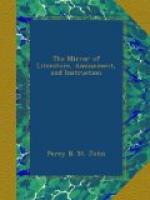Besides contributing to the Edinburgh Review, as we have noticed, Lord Brougham is the author of several papers in Nicholson’s Journal, and in the Transactions of the Royal Society, of which his Lordship is a distinguished member. The chief entire work which bears his name is entitled, “An Inquiry into the Colonial Policy of the European States,” 2 vols. 8vo. 1828; and a masterly pamphlet “On the State of the Nation,” which has run through many editions. Several of his speeches have likewise been published.
It is, however, in connexion with Public Education, that the pen of Lord Brougham has been more extensively employed. His zealous co-operation with Dr. Birkbeck, and other patriotic men of talent, in the establishment of Mechanics’ Institutions in the year 1824, must be gratefully remembered by thousands who have enjoyed their benefits; and, for the advantage of the London Mechanics’ Institution, were republished from the Edinburgh Review, his excellent “Practical Observations upon the Education of the People, addressed to the Working Classes and their Employers.”—The twentieth edition of this pamphlet is now before us, and from its conclusion, to show the practical utility of the author’s suggestions, we quote the following:—
“I rejoice to think that it is not necessary to close these observations by combating objections to the diffusion of science among the working classes, arising from considerations of a political nature. Happily the time is past and gone when bigots could persuade mankind that the lights of philosophy were to be extinguished as dangerous to religion; and when tyrants could proscribe the instructors of the people as enemies to their power. It is preposterous to imagine that the enlargement of our acquaintance with the laws which regulate the universe, can dispose to unbelief. It may be a cure for superstition—for intolerance it will be the most certain cure; but a pure and true religion has nothing to fear from the greatest expansion which the understanding can receive by the study either of matter or of mind. The more widely science is diffused, the better will the Author of all things be known, and the less will the people be ’tossed to and fro by the sleight of men, and cunning craftiness, whereby they lie in wait to deceive.’ To tyrants, indeed, and bad rulers, the progress of knowledge among the mass of mankind is a just object of terror: it is fatal to them and their designs; they know this by unerring instinct, and unceasingly they dread the light. But they will find it more easy to curse than to extinguish. It is spreading in spite of them, even in those countries where arbitrary power deems itself most secure; and in England, any attempt to check its progress would only bring about the sudden destruction of him who should be insane enough to make it.




